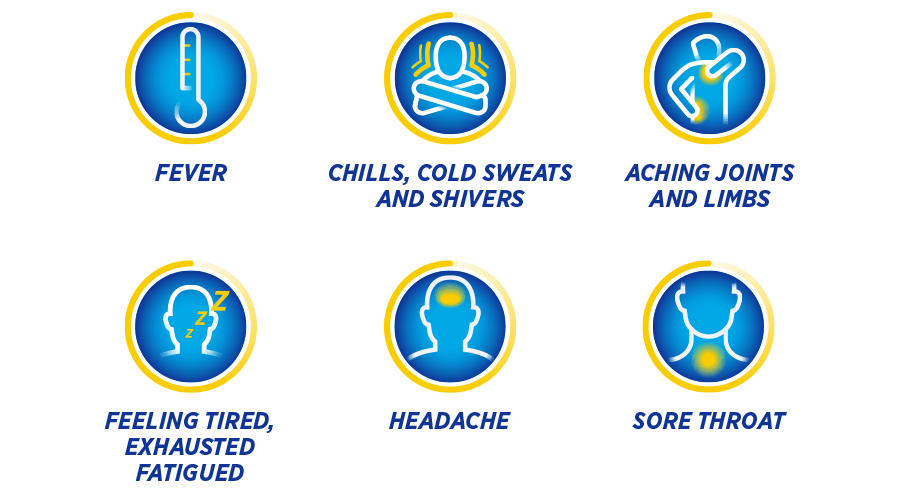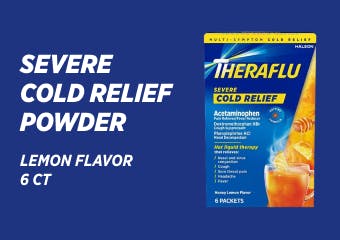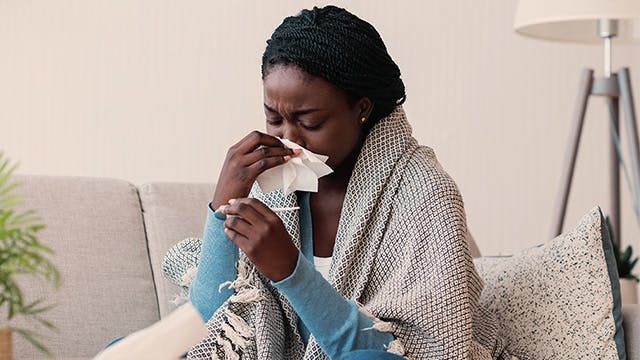What are the symptoms of a flu?
Not everyone experiences the same symptoms in the same way. Some symptoms that you may experience with the flu include:3
- Fever
- Chills, cold sweats and shivers
- Aching joints and limbs
- Feeling tired, exhausted fatigued
- Headache
- Sore throat
- Nausea, vomiting, and diarrhea can happen too, but these symptoms tend to happen to children more than adults.
How do you know if you have the flu?
Flu symptoms come on fast.3 You’ll be going through your day as you normally do, but as soon as the flu hits you’ll suddenly start to feel ill. The flu may seem like a common cold at first with a runny nose, sneezing, and sore throat. But unlike a cold, which usually develops slowly, the flu develops much faster.4 In fact, another sign that you may have the flu is if your symptoms are worse than a cold. The flu is generally worse than the cold, and the symptoms are more intense. The flu can come with very serious complications, whereas colds do not usually result in serious health problems.5 The best way to differentiate a cold from a flu is to keep track of how quickly you felt sick and how sick you feel. You can also think back on whether you interacted with someone who had the flu within the last week.

The flu may seem like a common cold at first with a runny nose, sneezing, and sore throat. But unlike a cold, which usually develops slowly, the flu develops much faster.4
Is the flu serious?
Usually, the flu goes away on its own after about a week, but the feeling of tiredness can hang around for several weeks. However, the flu can be very serious for newborns, the elderly, and people with certain health conditions.3 If you or a loved one are experiencing any complications with the flu, you should visit a doctor as soon as possible.
How to ease flu suffering
Unfortunately, most viral infections like the flu don’t come with a cure. Taking antiviral medications may reduce the length of the flu and help prevent more serious problems, but there’s no way to instantly get rid of the flu.4 Some ways to manage the flu include:
- Staying at home and resting.
- Drinking a lot of water and other liquids.
- Using Theraflu products to reduce the discomfort of cold and flu symptoms.
- Antiviral medications may help. Contact your physician as soon as you notice the symptoms.
You may want to get up and go to work or school, but it’s smarter not to.1 If you think you have the flu, do yourself and everybody else a favor and avoid contact with others. You can easily pass the flu to somebody else when you’re sick. The best way to avoid contact with others is to stay home until your symptoms are gone. The CDC recommends that people stay home for at least 24 hours after their fever is gone except to get medical care or other necessities.6 Getting plenty of rest at and drinking lots of fluids will help your body recover faster. As an added bonus, by limiting your contact with others, you reduce the possibility of spreading the virus.
When flu symptoms have you down, Theraflu has your back with powerful symptom relief. Relieve your flu symptoms with Theraflu Flu & Sore Throat Hot Liquid Powder and Theraflu ExpressMax Severe Cold & Flu Syrup.
When flu symptoms have you down, Theraflu has your back with powerful symptom relief. Relieve your flu symptoms with Theraflu Flu & Sore Throat Hot Liquid Powder and Theraflu ExpressMax Severe Cold & Flu Syrup.






